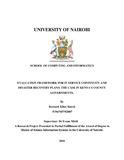Evaluation framework for it service continuity and disaster recovery plans: the case in Kenyans county governments.
Abstract
Information Technology and Systems are bound to fail due to various reasons at one time or the other. Business and organizations rely more on systems these days than before. If these failures happen it affects objectives of the business negatively. To alleviate these failures, IT industry addresses them through various technologies, legal and industry regulatory frameworks. IT industry is evolving at an unprecedented rate. Solutions to past problems are obsolete within short span of time. Therefore there is no way that solutions to past problems are effective today. There is no single methodology that can ensure 100% full recovery after a business disruption, there is a need for a set of benchmarks or standards to help ensure an adequate level of survivability, resources are used efficiently, and the best criteria for IT service continuity frameworks are adopted. The objectives of this research was to assess implementation of IT service continuity initiatives in Kenya‘s County governments and secondly to formulate a framework to evaluate IT service Continuity and Disaster Recovery programmes on Information systems in Kenya‘s counties. An effective IT service continuity planning framework assures information availability and its survivability. This study assessed IT service continuity plans or initiatives in the counties and secondly interrogated key Information Systems frameworks in existence which were found to be complex and expensive to be employed by county governments hence the study finally formulated a cost effective and simplistic framework that ensures credible assessment of the plans or any initiative at minimum effort. It also validated the framework by adopting a scoring system to test it based on assigned parameters against collected field data.
Publisher
University of Nairobi

